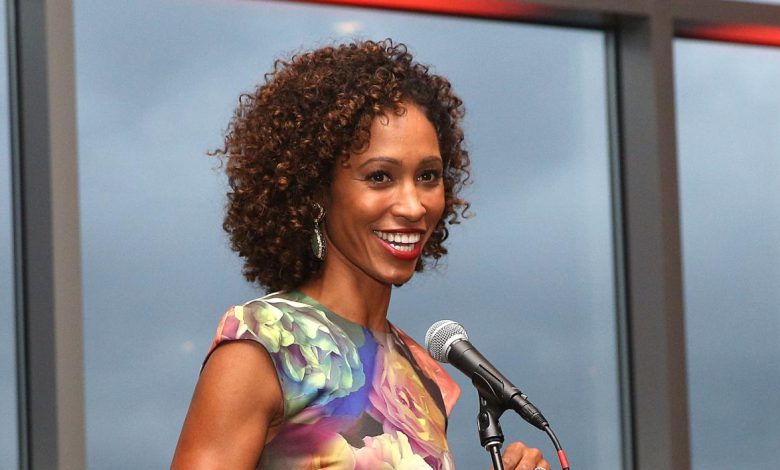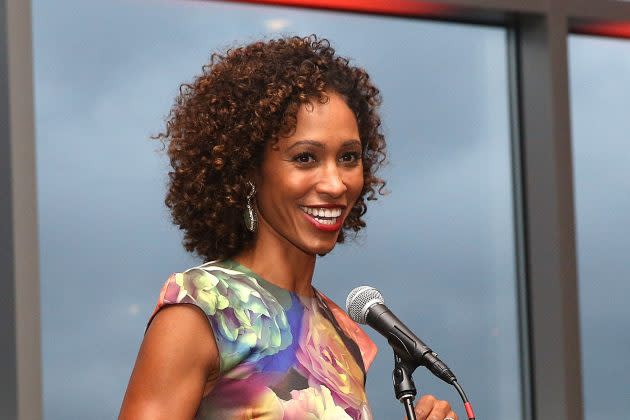Sage Steele Sues CAA for Breach of Fiduciary Duty During Her Free Speech Battle With ESPN (EXCLUSIVE)


Former ESPN anchor Sage Steele waged a high-profile battle with Disney over her right to free speech. Now, she’s going to war with CAA.
Steele is suing her agents of the past 11 years for breach of fiduciary duty over how they handled her contentious standoff with ESPN and its parent company Disney following controversial remarks she made in 2021 about COVID-19 vaccine mandates.
More from Variety
In a lawsuit filed Tuesday morning in L.A. County Superior Court, obtained by Variety, Steele claims that agent Matthew Kramer, the agency’s co-head of sports media, failed to do the bare minimum when she faced backlash from her employer over comments she made about the network’s COVID vaccine mandate on the podcast “Uncut With Jay Cutler.” The complaint says Kramer told his client that he would have the “head of CAA legal” review her contract but instead sent the contract to a junior attorney in CAA’s business affairs department to review.
According to the complaint, the agency “failed to give Steele the legal advice it had agreed to provide her, and failed to advise Steele that she should consult an attorney who was experienced in free speech and employment rights. Any such attorney — or indeed, any attorney who ran even the most cursory Google search on free speech laws in Connecticut (where both Steele and ESPN are located) — would have advised Steele that her comments were well within her rights under the laws of Connecticut, which prohibits employers from punishing employees from exercising their constitutionally guaranteed free speech rights.”
At the time, Kramer advised Steele to acquiesce to ESPN’s demands that she publicly apologize, something she opposed. Instead, CAA prioritized its relationship with ESPN and parent company Disney over its obligation to its client and “sacrificed her so it could continue to reap the benefits from its profitable relationship with the companies,” the complaint adds. Steele claims that CAA’s shoddy representation resulted in irreparable harm to her career.
“Her long-term career prospects have been immeasurably damaged as a result of her reasonable reliance on the advice and counsel of CAA,” the complaint notes. “Moreover, she has suffered enormous emotional, mental, and physical harms resulting from the stress of being left by CAA to twist in the wind rather than standing up for her rights.”
Much of the blistering complaint relies on statements Kramer made under oath before the California Labor Commission in a quiet battle waged by the agency with Steele over fees it was trying to extract from its client. When asked under cross-examination in that matter “if he could even identify the ‘head of CAA legal,’ Kramer responded, ‘I don’t know that answer’ — even while CAA’s deputy general counsel, Niloofar Shepherd, sat across the room observing his testimony.”
In an awkward twist, Steele is still a CAA client.
“After trusting CAA for nearly a decade, I am beyond disappointed that my agents and legal advisors chose to abandon me and not fulfill their obligation to represent me when I needed them most,” Steele says in a statement to Variety.
Variety has reached out to CAA for comment.
The case could have implications for every CAA client who doesn’t have a separate transactional lawyer and instead relies on the agency’s business affairs attorneys to review and red-line contracts, likely affecting about one-third of its roster. At the heart of Steele’s suit is the idea that CAA was providing de facto legal services throughout their relationship. When courting potential clients, CAA is known for touting its one-stop approach to representation, rivals say, pitching the idea that clients don’t need expensive managers and attorneys and can instead be serviced entirely under the agency umbrella.
“This case exemplifies the morally corrupt ways CAA routinely engages in self-dealing, overt conflicts of interest and willful misconduct,” the complaint says. “[Steele] sought professional and legal advice from CAA at a time she was being persecuted for exercising her First Amendment rights. Rather than advocate for her or guide her to seek appropriate legal counsel, CAA immediately sided with ESPN and its parent company Disney. … As Kramer, Steele’s agent at the time, recently testified under oath, he made no attempt whatsoever to stand up to the demand that Steele apologize, or to seek legal counsel on her behalf or advise her to seek independent legal counsel. As it has time and time again, CAA failed to act in accordance with its fiduciary duty.”
Steele, a 16-year veteran of ESPN who was a familiar face on the network’s “SportsCenter” and “NBA Countdown,” ran afoul of her employer after appearing on “Uncut With Jay Cutler” in September 2021, at the height of the Covid pandemic. During the 71-minute interview, Steele explained that she had reluctantly received the Covid vaccine in order to remain in compliance with Disney policy, which required salaried and non-union workers to be fully vaccinated at the time. She proceeded to slam her employer’s mandate as “sick” and “scary.”
“Throughout the podcast, Steele’s comments were measured and respectful,” the suit says. “She repeatedly recognized the value of the opinions of those who might disagree with her, and at all times was simply voicing her personal views on matters of public concern.”
Though the interview took place on Steele’s day off and her comments were not presented as representing the network, ESPN and Disney forced her to apologize in a statement and suspended her in October 2021. The complaint says, “Kramer refused even to consider standing up for Steele and pushing back against the demand for a public apology, instead forcefully telling Steele that if she failed to apologize, she would be fired — in an apparent attempt to bully and manipulate her into admitting blame and quietly accepting her unjust punishment rather than standing up for her rights.”
The complaint goes on to detail how entangled CAA is with ESPN and how that relationship affected its handling of backlash to her comments, which spawned a media maelstrom, with colleagues attacking her on social media. Notably, Kramer, was in the process of negotiating new deals with ESPN for Adam Schefter and Adrian Wojnarowski, which brought in millions in commissions to the agency.
“What Steele did not then know was that CAA’s advice was irredeemably tainted by its undeniable and undisclosed conflicts of interest,” the suit adds. “CAA represents a number of other ESPN employees, including on-air talent and executives, and CAA had to maintain good relations with ESPN to keep the lucrative commissions flowing from those deals. CAA also represents a number of athletes, who depend on CAA’s ability to obtain favorable coverage from ESPN. CAA made the calculated, inexcusable choice to preserve its own cozy relationship with ESPN, at Steele’s expense.”
Upon returning to work following her suspension, she no longer was assigned to any of the high-profile gigs that she previously anchored including the New York City Marathon and the Rose Parade.
In April 2022, Steele sued ESPN and Disney. Her suit coincided with Disney waging its own high-profile free speech battle with Florida Gov. Ron DeSantis after filing a lawsuit in federal court that claimed the Republican retaliated against the company for opposing the state’s so-called “Don’t Say Gay” bill. DeSantis followed with a countersuit against Disney. (In January, a federal judge dismissed Disney’s lawsuit against DeSantis, and the two parties settled their respective lawsuits against one another in March.)
Steele exited ESPN in August after settling her suit with the sports network and Disney. Terms of that resolution were not disclosed. In March, Steele began working with Bill Maher and his Club Random Studios, which launched “The Sage Steele Show” as part of its growing portfolio of podcasts. Maher himself may or may not be feuding with CAA. That same month, The Hollywood Reporter reported that the “Real Time” host had dumped the agency after not being invited to partner Bryan Lourd’s Oscars party, but Puck disputed that report. Maher told Variety in March that Maher says “nothing has been decided” regarding his relationship with CAA. He still appears as a client on CAA Speakers’ website, but his IMDbPro entry no longer lists CAA among his representatives. (A CAA spokesperson says Maher remains a client.)
Steele’s suit against CAA comes on the heels of actress Julia Ormond suing the agency in October for allegedly enabling Harvey Weinstein’s sexual abuse. The Ormond case is referenced repeatedly in Steele’s suit as a similar instance of CAA allegedly putting its financial interests ahead of doing right by its clients. That complaint says Ormond informed her agents Lourd and Kevin Huvane that she was sexually assaulted by Weinstein, and they allegedly cautioned her from speaking out and later dropped her as a client. Steele’s suit also points to former clients like Terrence Howard, David Simon and Meredith Stiehm suing CAA.
Steele is being represented by high-profile Hollywood litigator Bryan Freedman, who is no stranger to legal brawls involving CAA. Freedman represented UTA against CAA when the latter sued the former when 11 agents defected from CAA to join UTA, an infamous incident in Hollywood annals dubbed the “midnight raid.” That four-year legal fight was resolved in 2019. Terms of the settlement were not disclosed. Freedman also reps four former CAA agents — Jack Whigham, Dave Bugliari, Michael Cooper and Mick Sullivan — who are in arbitration with the agency after leaving CAA to launch management company Range Media.
According to Steele’s complaint, she was forced to engage in “protracted and costly litigation” against ESPN, which could have been avoided had CAA advocated for her interests instead of telling her to apologize. The complaint also highlights a double standard that Steele believes she faced. “CAA could have insisted that ESPN treat Steele fairly and evenhandedly by taking the same stance on Steele’s comments that it had taken on countless other employees’ public political comments, many of which were far more controversial and took place on ESPN’s platforms, but were apparently deemed acceptable by ESPN because they reflected a left-wing perspective,” the suit says. “(For example, Elle Duncan and Malika Andrews (both represented by CAA, with Matt Kramer (Steele’s agent at the time of the relevant events) personally representing Andrews), were allowed and even encouraged to give their controversial political opinions on ESPN airtime, while facing no consequences whatsoever.) Any of these actions would have demonstrated that CAA was acting on Steele’s behalf and in her best interest.”
Best of Variety
Sign up for Variety’s Newsletter. For the latest news, follow us on Facebook, Twitter, and Instagram.
Source link




